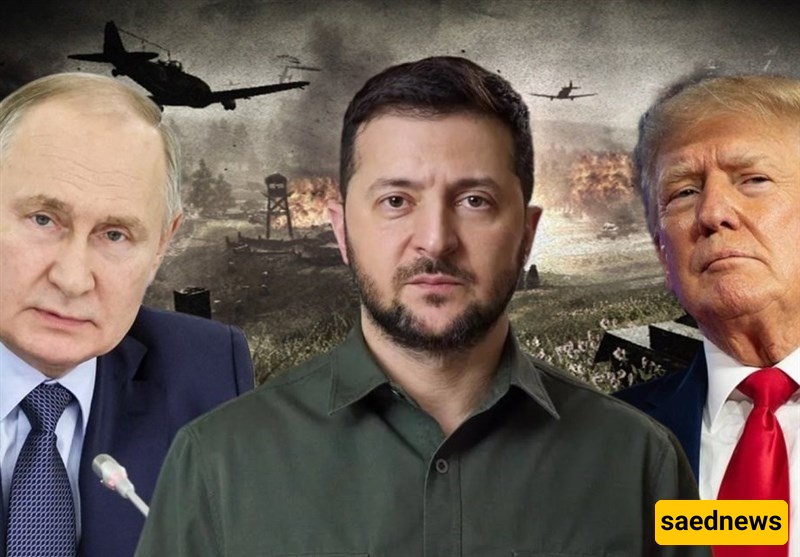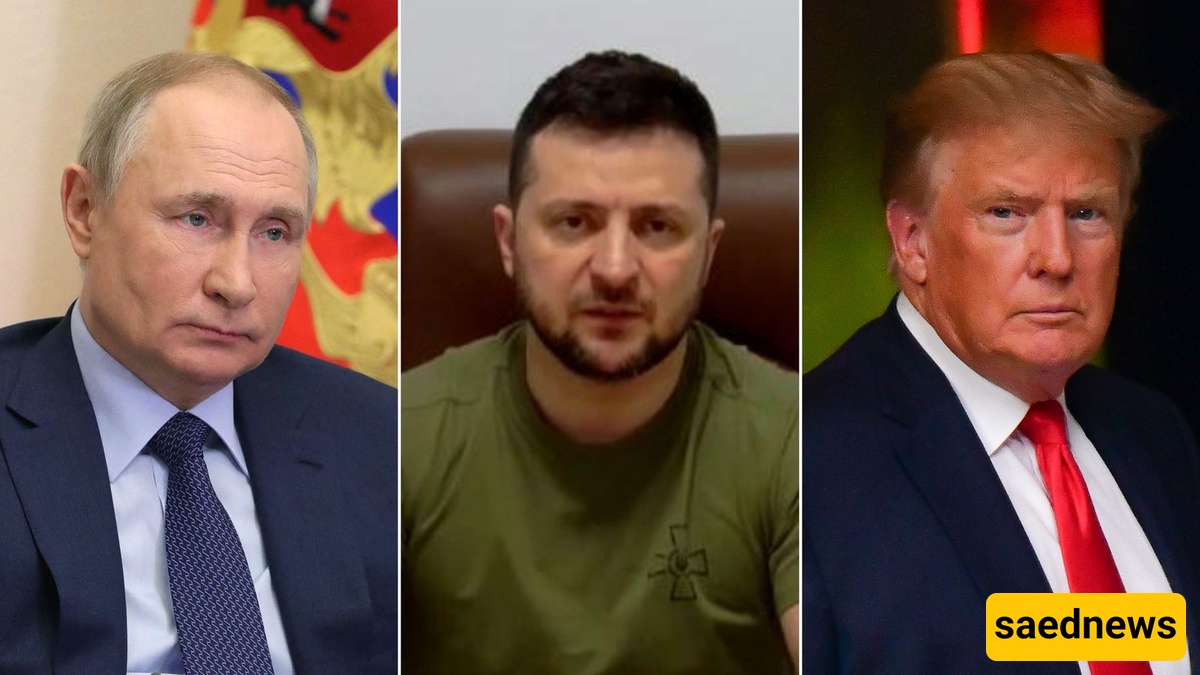SAEDNEWS: Concerns in Kyiv and Europe revolve around the possibility that decisions may be made without Ukraine’s presence, leading to violations of the country’s territorial integrity. The European Union and NATO have emphasized that talks must include Ukraine and focus on its security and sovereignty.

According to Saed News, quoting Reuters, on the eve of the United States-Russia summit in Alaska, Volodymyr Zelensky, President of Ukraine, has secured strong support from the European Union and NATO to attend this sensitive meeting — a summit that could determine the future course of the Ukraine war and the balance of power in Europe for years to come.

The main concern in Kyiv and European capitals is that an agreement might be reached between Donald Trump and Vladimir Putin without Ukraine’s direct participation, resulting in decisions that threaten the country’s territorial integrity. Zelensky has warned that any deal made without Ukraine’s involvement “will be stillborn from the moment of its birth” and that such a deal would not only lack durability but could also trigger new crises in the region.
In recent days, the European Union and NATO have taken clear positions on this matter. European leaders, including European Commission President Kaja Kallas, and senior NATO officials have stated that any negotiations about Ukraine’s future must involve representatives from the country. They argue that excluding Ukraine from the negotiation table is not only unfair but also practically ineffective, as decisions made without the consent of the main party to the conflict will not be enforceable. These stances, alongside the EU’s ongoing political and financial support for Ukraine, have provided Zelensky with significant diplomatic leverage to pressure Washington and Moscow.
Zelensky has made extensive efforts in recent months to gain international support. He has repeatedly visited European capitals, spoken at parliamentary sessions, and delivered a clear message: “Our fate should not be decided without us.” This approach has become especially crucial following reports suggesting Trump’s willingness to negotiate directly with Putin for a quick solution. Trump previously made controversial remarks claiming the Ukraine crisis could be resolved in “a few days,” statements widely interpreted as implying acceptance of a territorial deal — something Zelensky and most of his allies consider a red line.
Meanwhile, Moscow has sent mixed signals. Putin, while conditionally welcoming dialogue with the West, has emphasized that conditions for direct talks with Zelensky “are not yet ripe.” From the Kremlin’s perspective, until Kyiv accepts some Russian demands, including recognition of the current status of occupied territories, direct negotiations would be futile. This stance indicates that even if Trump is willing to invite Zelensky, significant obstacles remain for trilateral talks.
Europe is concerned that Washington and Moscow, eager to reach an agreement securing their own interests, might sideline Ukraine’s security issues. The historical memory of Cold War-era backdoor agreements like the Yalta Conference remains vivid in European political circles. European leaders fear that excluding Ukraine could lead to a repeat of a scenario in which critical decisions are made without considering the country’s wishes and interests.
NATO’s support for Zelensky’s position is notable in this context. NATO Secretary-General Jens Stoltenberg has reaffirmed the alliance’s commitment to its principles, pledging to defend Ukraine’s sovereignty and territorial integrity. According to him, any peace agreement must be based on the UN Charter and international law and cannot be the result of imposed conditions by any single party. These statements, alongside ongoing Western military and intelligence assistance, indicate that practical support for Ukraine will continue even if the U.S. and Russia engage in talks.
However, domestic political dynamics in the United States also affect this issue. Trump, now serving his second term, has adopted a different approach than his predecessor, openly advocating for reduced U.S. expenditures on the Ukraine war. He has repeatedly stated that European allies should bear a larger share of the costs and that America should not write a “blank check” for Ukraine. This stance has pushed Zelensky to rally strong European and NATO support to shift the balance of power in any forthcoming negotiations in his favor.
Inside Ukraine, these developments are being followed with great sensitivity. Media and political elites closely monitor every report and statement, and concerns about a potential “land deal” are rising. Zelensky’s government is striving to maintain public morale while sending a clear message to the global community: Ukraine is ready for peace, but not at any cost. For him, preserving territorial integrity and sovereignty is not only a non-negotiable principle but also a foundation of the nation’s identity.
The outlook for the Alaska summit remains uncertain. On one hand, international pressure to end the war and prevent its escalation is mounting, and many analysts believe the window for a sustainable agreement is narrow. On the other hand, fundamental disagreements and lack of mutual trust make reaching such a deal difficult. In this context, Ukraine’s presence or absence at the negotiation table could be decisive.
Various scenarios are proposed for the summit. The first is a bilateral discussion between Trump and Putin without Zelensky, which risks ignoring Ukraine’s interests. The second involves adding a trilateral meeting including Ukraine’s leader, which proponents say could pave the way for a broader and more durable agreement. The third scenario envisions a wider framework involving Europe and other stakeholders, which is more complex but could offer stronger security guarantees.
As the date of the Alaska meeting approaches, public pressure on world leaders to ensure Ukraine’s participation is growing. Analysts believe excluding Ukraine is not only morally wrong but would likely render any agreement ineffective in practice, as Kyiv and its people would feel no commitment to a deal made in their absence.
Zelensky is fully aware that his window to influence this process is limited. Through intensive diplomatic travels, phone calls with world leaders, and use of international media, he is increasing pressure on Washington and Moscow to guarantee Ukraine’s role in the process. His message is simple but powerful: “No one knows better how to build lasting peace than we do, because we have paid the price of war in blood and destruction.”
Despite all uncertainties, one fact is clear: the Alaska summit is not only a test for global diplomacy confronting one of the most complex contemporary crises but also a critical measure of the international community’s commitment to principles like national sovereignty, territorial integrity, and justice in international relations. How the summit proceeds and the extent of Zelensky’s success in securing a seat there could have profound implications for Ukraine’s future and the international order in the years ahead.

